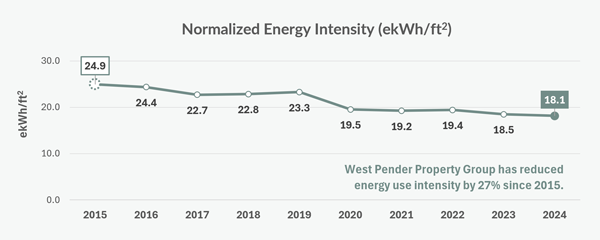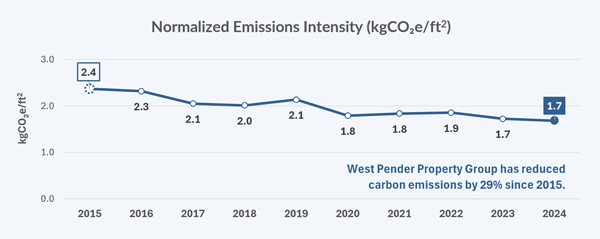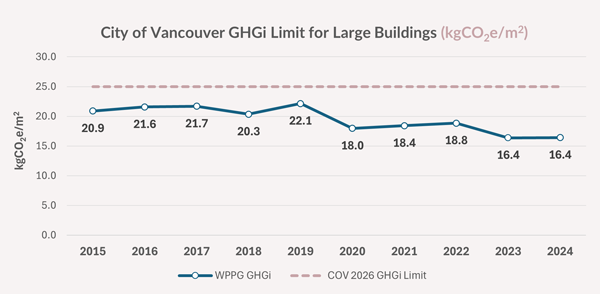Environmental Sustainability at West Pender Property Group
At West Pender Property Group, we’re dedicated to providing premium office space for our tenants that support a shared vision of reducing the environmental footprint of our properties:
- We track our energy and water utility consumption and monitor consumption patterns.
- We regularly complete energy, water, and waste studies to identify efficiency opportunities.
- We implement energy and water efficiency projects that continue to improve building performance.
- We validate our efforts and benchmark against industry best practice by certifying through the BOMA BEST Building Certification Program.
Our Strategy
Our environmental sustainability strategy builds on our efforts across four key areas: Climate, Energy, Water, and Waste. We prioritize accountability and stakeholder engagement to ensure that the values of environmental sustainability are embedded across our organization and properties.
| Climate | Create a plan and set targets for greenhouse gas emissions reductions across our operations, while also understanding and adapting to the climate risks our properties will be exposed to. |
| Energy | Create an inventory of major energy end-uses in our buildings and identify opportunities for energy efficiency. |
| Water | Identify opportunities for conservation or re-capture to conserve water throughout our properties. |
| Waste | Engage with tenants to reduce the amount of waste produced onsite, while improving reuse and diversion practices. |
| Accountability | Assess the environmental impacts associated with our operations, set goals for improvement, and transparently report on our progress. |
| Stakeholder Engagement | Engage our team and our tenants in our sustainability efforts to support mutual goals. |
Our 2024 Performance Results
To measure our sustainability performance, West Pender Property Group maintains BOMA BEST Sustainable certification across all of our office properties. This nationally recognized program provides property owners and managers with a consistent framework to evaluate and report on the performance and management of existing buildings. It covers a wide range of sustainability categories in which to assess a building’s energy, carbon, water, indoor air quality, accessibility, wellness, waste, and resilience features and performance.
To achieve certification, property owners and managers demonstrate that they meet BOMA’s baseline Best Practices and complete a questionnaire to earn points towards a specific level of certification: Platinum, Gold, Silver, Bronze, and Certified. All of our properties are currently certified at the Gold level, and we are committed to maintaining this high standard as we prepare for recertification in fall 2025.
Energy Use Intensity
Our most significant environmental impact arises from the greenhouse gas emissions (GHGs) associated the energy consumption of our office buildings. We track our performance in this area by measuring the energy use intensity (EUI) of our portfolio—comparing energy consumption, as reported on utility bills, against the total gross floor area of our properties, adjusted for weather variations.
As of the end of 2024, our energy management efforts have resulted in a 27% reduction in energy use intensity compared to our 2015 baseline.

Carbon Emissions Intensity
In addition to tracking energy consumption, we also monitor the normalized greenhouse gas (GHG) emissions intensity of our office portfolio. This metric compares energy-related carbon emissions to the total gross floor area of our buildings, adjusted for weather variations. In 2024, the normalized carbon emissions intensity of our portfolio was 1.7 kg CO₂e/ft²—a 29% reduction compared to our 2015 baseline.

City of Vancouver’s GHGi Limits for Large Buildings
The City of Vancouver’s Annual Greenhouse Gas and Energy Limits By-Law requires owners and managers of commercial buildings over 4,645 square metres (50,000 ft²) to measure and report energy use and associated greenhouse gas (GHG) emissions. Beginning in 2026 and phasing in through 2040, large office buildings over 9,290 square metres (100,000 ft²) will also be subject to GHG intensity (GHGi) limits of 25 kg CO₂e/m² per year for emissions from fossil fuel combustion.
Six of our office buildings fall within the scope of this by-law, and three will be subject to the GHGi performance limit. The combined GHGi for these six properties is illustrated in the graph below. We are actively developing decarbonization strategies to ensure each building meets or exceeds the City’s intensity limits starting in 2026 and beyond.

Our Plans for Progress
As we continue work to improve our performance, we are focused on the following goals:
- Create a plan to decarbonize our largest buildings by 2040, in line with the City of Vancouver’s GHGi targets.
- Continue to drive energy and water efficiencies in our operations.
- Improve waste data and identify opportunities to reduce waste in our buildings.
- Maintain BOMA BEST Sustainable certification at our office properties.
- Engage our team and our tenants in our sustainability efforts to support mutual goals.
- Increase accountability and transparency by reporting on our progress towards our goals.







